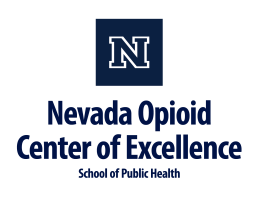Support from family and friends is crucial for individuals struggling with opioid use disorder.By fostering a supportive environment, loved ones play a crucial role in motivating their family member or friend to seek professional help, navigate treatment options, and remain committed to their recovery journey.

Websites
SAMHSA’s National Helpline
SAMHSA's National Helpline is a free, confidential, 24/7, 365-day-a-year treatment referral and information service (in English and Spanish). Call 1-800-662-HELP (4357) or visit the website.
988 Suicide & Crisis Lifeline – Call. Text. Chat.
The 988 Lifeline provides 24/7, free and confidential support for people in distress, prevention and crisis resources for you or your loved ones, and best practices for professionals in the United States.
National Institute of Drug Abuse (NIDA)
Information on how drugs affect the brain and body for teens, teachers, and parents.
Stop Overdose
To address the increasing number of overdose deaths related to both prescription opioids and illicit drugs, the Centers for Disease Control and Prevention (CDC) created a website to educate people who use drugs about the dangers of illicitly manufactured fentanyl, the risks and consequences of mixing drugs, the lifesaving power of naloxone, and the importance of reducing stigma around recovery and treatment options.
Behavioral Health Nevada
This website is a database of behavioral health providers in Nevada specializing in substance use disorder and co-occurring mental health disorder treatment services. All agencies listed are Certified by the Division, SAPTA (Substance Abuse Prevention and Treatment Agency).
CASAT OnDemand
CASAT OnDemand delivers information and resources that will help you to provide high-quality, cutting edge treatment services, prevention programming, recovery support, maintenance, and other behavioral health-related services.
Tools & Resources
SafeSpot
SafeSpot is a free, 24/7, national hotline that is staffed by a dedicated team of people with lived and living experience with overdose and drug use. The number one risk factor for fatal overdose is using alone and we are there for you when others cannot be. SafeSpot connects people who are using drugs with a trained operator who can call for help in case of overdose.
When can I obtain treatment information about my loved one? (decision chart)
The HIPAA Decision Tree for Adult Patients is a guide that helps determine when a healthcare provider can share treatment information about an adult patient under HIPAA regulations, based on factors such as the patient's decision-making ability, the requester's role in their care, and potential risks to the patient.
Nevada Domestic Violence, Sexual Assault, and Human Trafficking Support Providers
This document provides an updated list of domestic violence and sexual assault service providers across Nevada, organized by county. These organizations offer critical support to victims of domestic violence, sexual assault, and human trafficking, including crisis hotlines, advocacy services, emergency shelter, and legal assistance. The resource list ensures that individuals in need can connect with local providers for immediate and long-term support.
12 Things Parents Can Do to Prevent Addiction
Opioid Treatment Program Directory
Find treatment programs in your state that treat addiction and dependence on opioids.
Start Your Recovery Nevada Treatment Locator
Start Your Recovery recently developed a comprehensive directory of support resources in Nevada where individuals can: Find local treatment options vetted by the Substance Abuse and Mental Health Services Administration; Filter to find free and low-cost support options; and Find support groups and other important non-clinical resources.
Nevada Fentanyl Test Strip Finder
A list and map of Fentanyl Test Strip Distribution Sites in Nevada.
Nevada Overdose Reversal Medication Finder
Find naloxone and overdose reversal medications in Nevada.
How to Use Fentanyl Test Strips
Infographics and step-by-step instructions.
Never Use Alone
Toll-free national overdose prevention, detection, life-saving crisis response and medical intervention services for people who use drugs while alone. Never Use Alone’s peer operators are available 24-hours a day, 7 days a week, 365 days a year.
PACT Coalition
The PACT Coalition seeks to empower Southern Nevada with the resources to prevent substance misuse for all ages and promote recovery through culturally competent advocacy, education, stigma reduction, support, and outreach. A diverse cross-section of community leadership is represented by the PACT Coalition that will work together to ensure a sustainable future and a healthier community. PACT Coalition keeps an updated resource list for Southern Nevada.
Join Together Northern Nevada
Join Together Northern Nevada (JTNN) is a coalition based in Northern Nevada whose mission is to create a healthy drug-free community by building successful partnerships to support prevention education and outreach. JTNN keeps an updated resource list for Washoe County students, staff, and families.
Overdose Reversal Medication for Individuals & Families
Guides to opioid safety and how to use overdose reversal medications.
Partnership to End Addiction
A text-based support and information system to help friends and family members of an individual misusing opioids.
Know Your Pain Meds
Provides information on how opioids work, alternatives to pain medicine, the overdose reversal medication naloxone, a substance use disorder treatment finder, and submit concerns you have about a medical provider.
Storage and Disposal of Medication
Improper prescription drug use is a serious public health issue. Storing and disposing of medications properly can help reduce harm.
Posters & Infographics
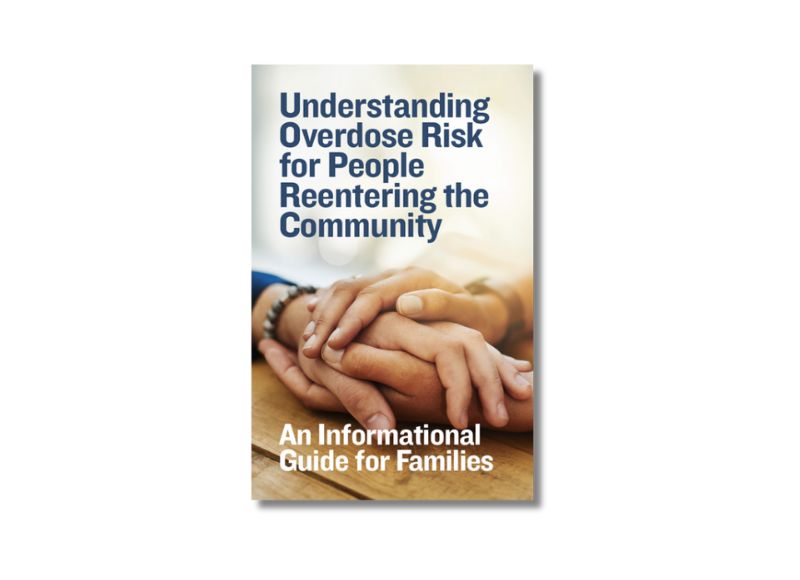
Understanding Overdose Risk for People Reentering the Community: An Informational Guide for Families
This guide for families touches on the critical role families play in the recovery process and outlines practical ways families can support their loved ones in avoiding relapse and overdose during reentry.
Download the Guide
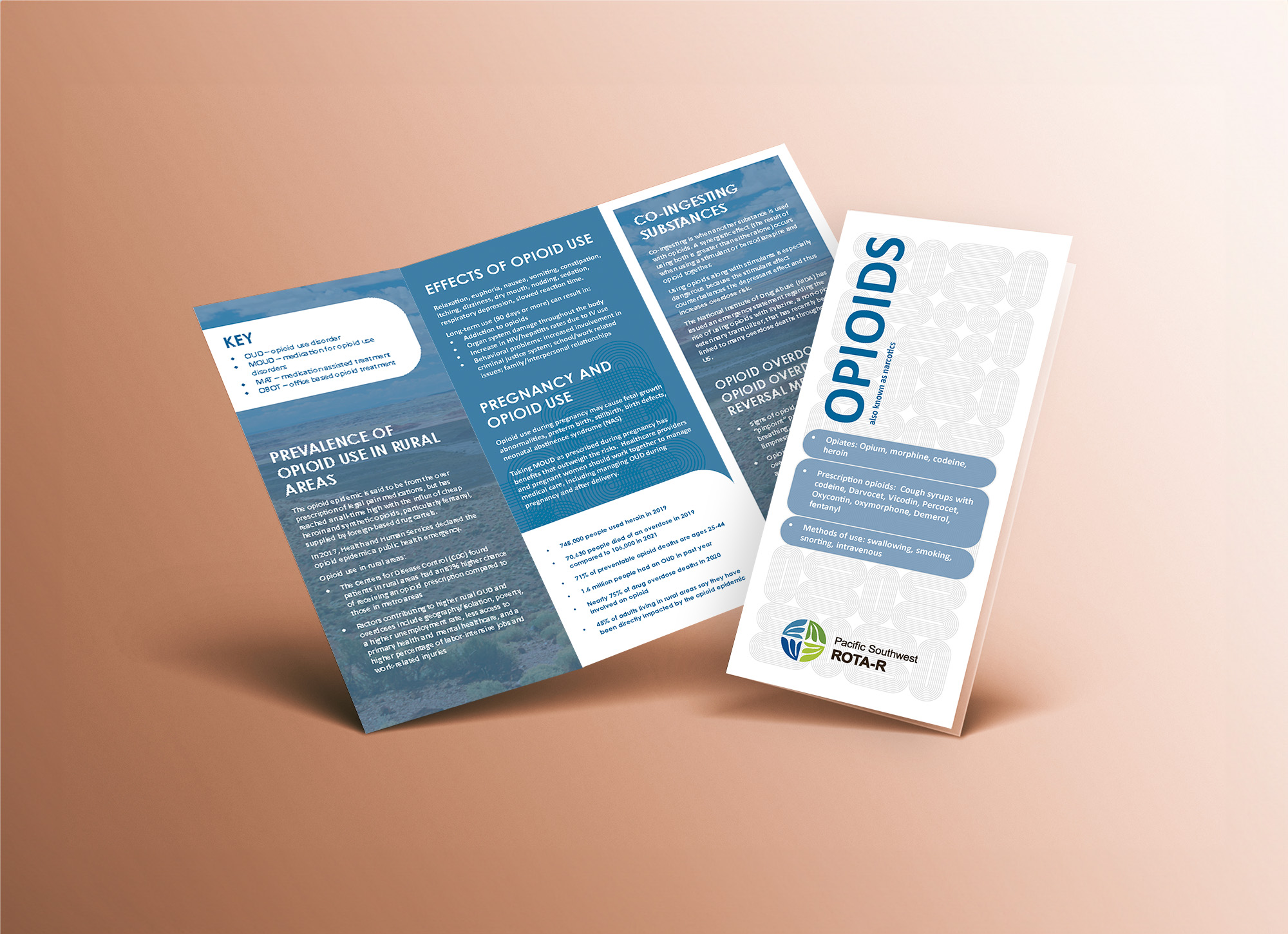
Opioid Trifold Brochures
Opioid Information Brochures for Providers or Consumers help educate on opioids and opioid use, including effects of opioid use, pregnancy and opioid use, medications for opioid use including opioid overdose reversal medications, and treatment options for persons using opioids.
Download or request free hard copies
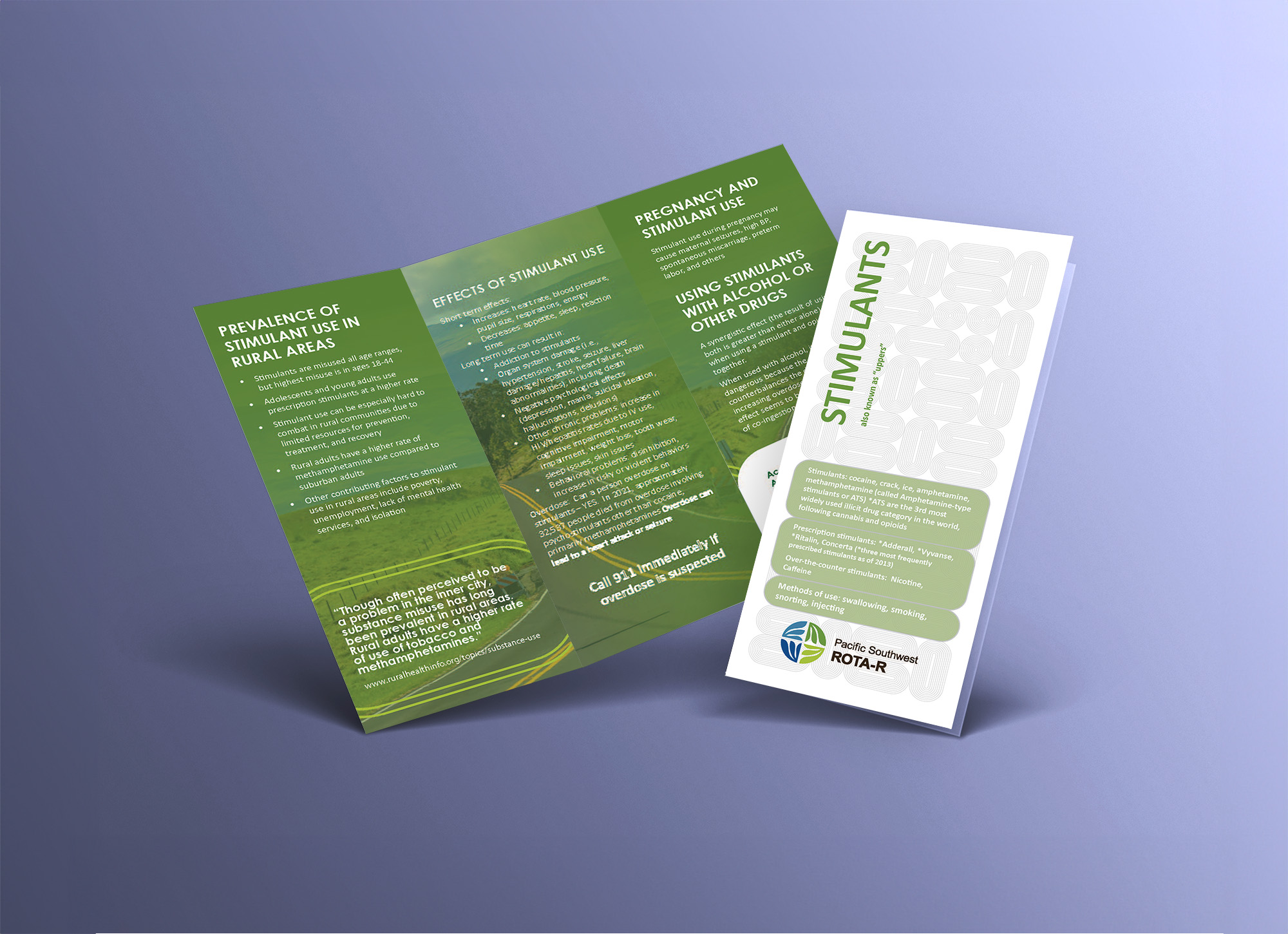
Stimulant Trifold Brochures
Stimulant Information Brochures for Providers or Consumers help educate on stimulants, including the effects of stimulants use, pregnancy and stimulant use, and treatment options for persons using stimulants.
Download or request free hard copies
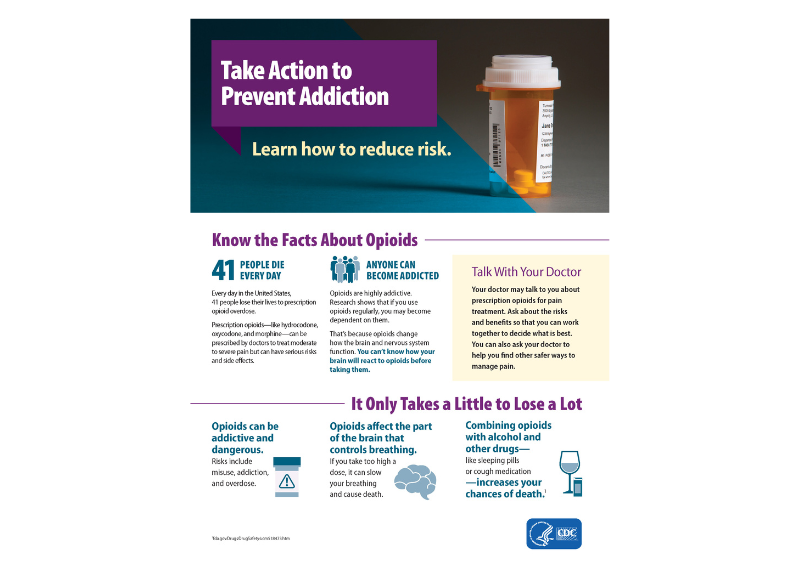
Prevent Addiction Fact Sheet
This face sheet contains information for patients about preventing opioid addiction.
Download the Fact Sheet
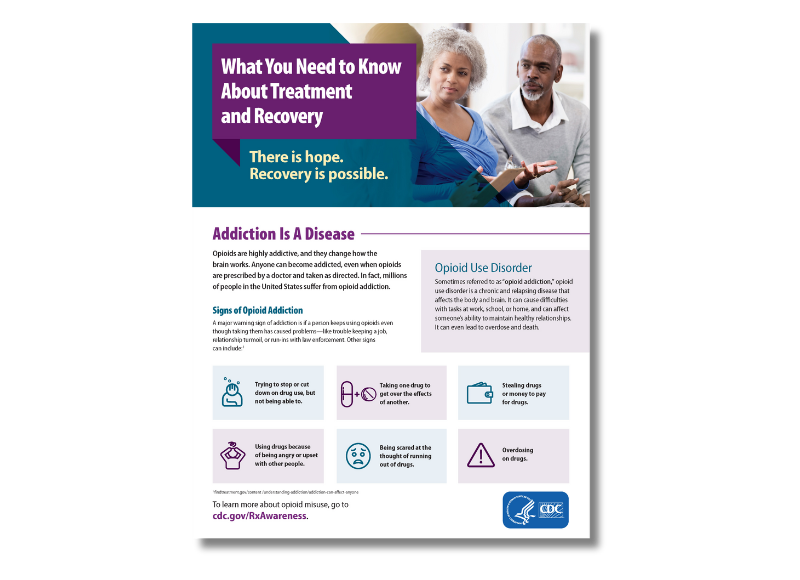
Opioid Use Disorder Treatment and Recovery Fact Sheet
This fact sheet contains important information about treatment and recovery of opioid use disorder for patients, families and friends.
Download the fact sheet
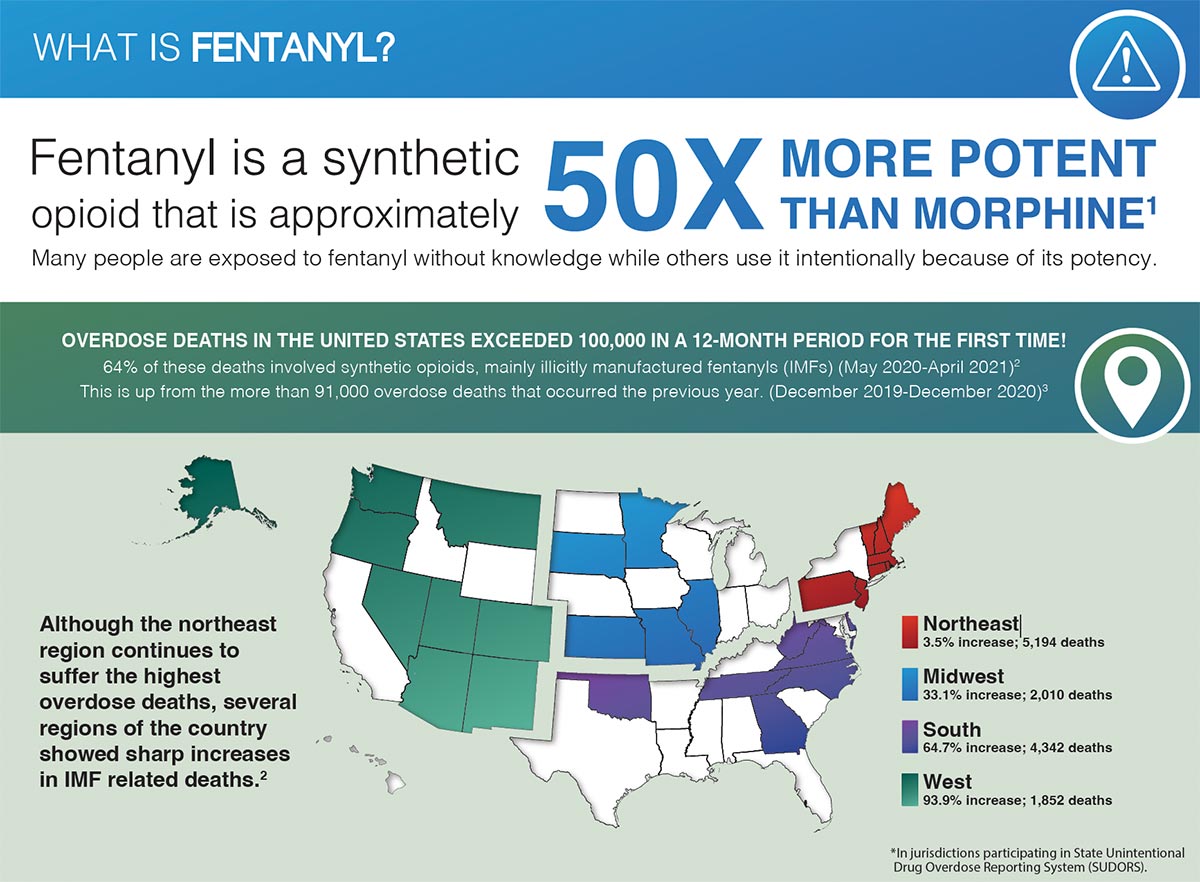
What is Fentanyl? Infographic
This infographic was developed by the National Institute on Drug Abuse.
Download the infographic
Publications
When Your Child, Teenager, or Adult Son or Daughter has a Mental Illness or Substance Use Disorder, Including Opioid Addiction: What Parents Need to Know about HIPAA
This resource explains how HIPAA allows healthcare professionals to share health information with a patient’s loved ones during emergencies or dangerous situations, such as an opioid overdose, when doing so is in the patient’s best interest. It clarifies that health providers can disclose information to family and caregivers without patient consent if the patient is incapacitated or poses a serious and imminent threat to their health. Additionally, it outlines limitations on sharing information for patients who have decision-making capacity and recognizes state laws regarding personal representatives who have authority over a patient’s health information.
How HIPAA Helps Family and Friends Stay Connected with Loved Ones Who Have a Substance Use Disorder, including Opioid Abuse, or a Mental or Behavioral Health Condition
This resource explains how HIPAA allows healthcare providers to share necessary health information with family and friends of individuals with substance use disorders (including opioid abuse) or mental health conditions when it is in the patient's best interest. It outlines how providers can notify loved ones in emergencies, share relevant treatment details for caregiving purposes, and grant full access to personal representatives who have legal decision-making authority.
Understanding Overdose Risk for People Reentering the Community: An Informational Guide for Families
This guide for families touches on the critical role families play in the recovery process and outlines practical ways families can support their loved ones in avoiding relapse and overdose during reentry.
Beyond Addiction: How Science and Kindness Help People Change
The most innovative leaders in progressive addiction treatment in the US offer a groundbreaking, science-based guide to helping loved ones overcome addiction problems and compulsive behaviors.
Facing Addiction in America: The Surgeon General’s Spotlight on Opioids
This publication by the Office of the Surgeon General provides an overview of the opioid epidemic in the United States and offers resources for individuals, families, and communities affected by opioid use disorder.
Heroin, Fentanyl, & Other Opioids: A Comprehensive Resource for Families with a Teen or Young Adult Struggling with Opioid Use
Fueled by drugs like heroin, fentanyl and the misuse of prescription pain pills, the opioid epidemic in our country has impacted countless families. To help address this, the Partnership for Drug-Free Kids created a new eBook — Heroin, Fentanyl & Other Opioids: A Comprehensive Resource for Families with a Teen or Young Adult Struggling with Opioid Use. Parents and families need to be prepared with the knowledge and skills to identify opioids, spot early use and take action effectively.
Growing Up Drug Free: A Parent’s Guide to Prevention
This guide offers parents the information they need to raise children who understand the risks of substance use. This guide includes an overview of substance use among children, youth, and young adults; descriptions of substances young people may use; a look at risk factors that may make children, youth, and young adults try alcohol, tobacco, or other drugs—and protective factors that help offset those risks; age-specific suggestions for how to talk to young people about alcohol, tobacco, and other drugs; and tips on what parents can do if they suspect their child is using alcohol, tobacco, or other drugs. The guide, “Growing Up Drug-Free: A Parent’s Guide to Prevention,” was funded by the U.S. Department of Justice, Drug Enforcement Administration and U.S. Department of Education, Office of Safe and Supportive Schools.
In My Own Words
A compilation of essays by individuals supported by Medication-Assisted Treatment in long-term recovery.
Overdose Prevention and Response Toolkit
This toolkit provides guidance to a wide range of individuals on preventing and responding to an overdose. The toolkit also emphasizes that harm reduction and access to treatment are essential aspects of overdose prevention.
Webinars & Online Learning
Current News & Research
DEA Reports Widespread Threat of Fentanyl Mixed with Xylazine
WASHINGTON - The U.S. Drug Enforcement Administration is warning the American public of a sharp increase in the trafficking of fentanyl mixed with xylazine. Xylazine, also known as “Tranq,” is a powerful sedative that the U.S. Food and Drug Administration has approved for veterinary use.
The Opioid Epidemic’s Toll on Children
This article from the Johns Hopkins Bloomberg School of Public Health discusses the opioid epidemics toll on children.
